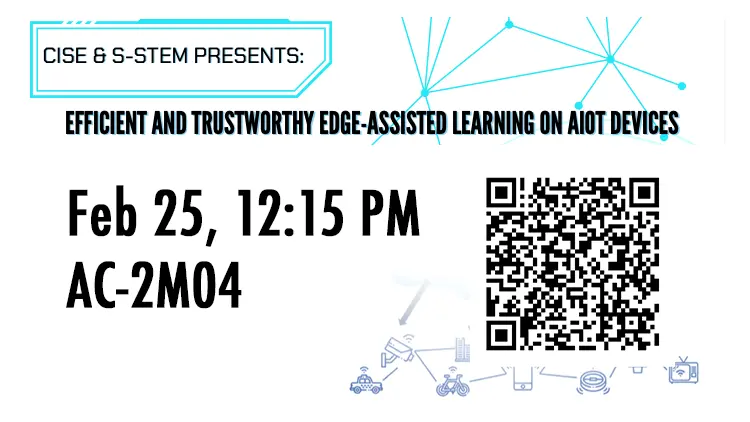Efficient and Trustworthy Edge-Assisted Learning on AIoT Devices
AC-2M04
CISE S-STEM Mathematics and Computer Science Department.
718-262-2535
This event examines innovative methodologies for efficient and trustworthy edge-assisted learning on AIoT devices. Experts will discuss advancements in edge computing, secure data processing, and AI integration to enhance performance on resource-constrained devices.
CISE & S-STEM Presents
AIoT end devices are usually equipped with limited computational resources for real-time inference and learning. In some applications such as drone systems, performing AI tasks on AIoT devices locally not only impacts real-time performance but also consumes significant energy which greatly reduces the on-duty time of the devices. With the emergence of 6G techniques such as open radio access networks (O-RAN), ubiquitous availability of edge computing servers is made possible. This allows AIoT devices to collaborate with nearby edge servers in real time and offload computation-heavy operations pertaining to AI inference and learning to these servers. To realize this AI paradigm, one major challenge in Artificial Intelligent of Things (AIoT) is to appropriately balance efficiency and data privacy as AIoT data will be sent to edge servers.
This talk will discuss several practical techniques toward efficient and secure AI task offloading in edge-assisted AIoT systems. The first technique is based on a light-weight cryptographic protocol that supports real-time data encryption and computation on encrypted data. This technique enables AIoT devices to securely offload AI inference tasks to edge servers without significant computation overhead and communication delay. The second technique employs secure hardware such as trusted execution environment (TEE) to enable offloading of training tasks in zero trust AIoT systems. A real-time learning state verification mechanism is designed to assure integrity of both AIoT devices and edge servers
while preserving data privacy. We implemented these algorithms and protocols on embedded devices such Raspberry Pi and commodity desktop computers and demonstrated the practicality of the proposed designs.
Speaker
Dr. Schucheng Yu Associate Professor
Stevens Institute of Technology

